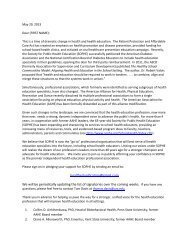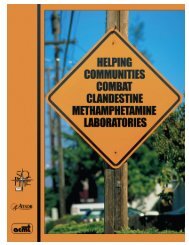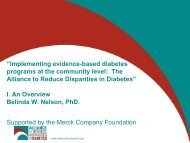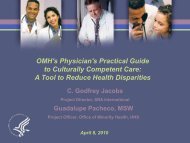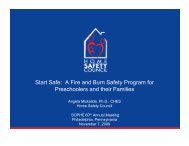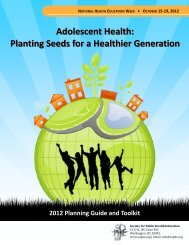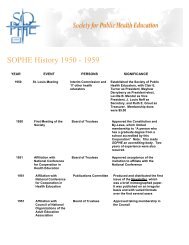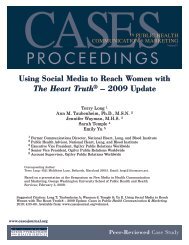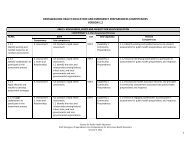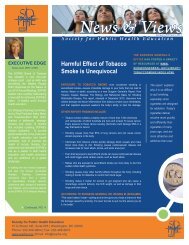- Page 8:
An Unhealthy AmericaMilken Institut
- Page 11 and 12:
iitime of the analysis show that th
- Page 13 and 14:
Existing estimates of the economic
- Page 16 and 17:
An Unhealthy AmericaMilken Institut
- Page 18 and 19:
An Unhealthy AmericaMilken Institut
- Page 20:
An Unhealthy AmericaMilken Institut
- Page 23 and 24:
An Unhealthy AmericaMilken Institut
- Page 25 and 26:
An Unhealthy AmericaMilken Institut
- Page 28 and 29:
An Unhealthy AmericaMilken Institut
- Page 30 and 31:
An Unhealthy AmericaMilken Institut
- Page 32 and 33:
An Unhealthy AmericaMilken Institut
- Page 34 and 35:
An Unhealthy AmericaMilken Institut
- Page 36:
An Unhealthy AmericaMilken Institut
- Page 39 and 40:
An Unhealthy AmericaMilken Institut
- Page 42 and 43:
An Unhealthy AmericaMilken Institut
- Page 44:
An Unhealthy AmericaMilken Institut
- Page 48 and 49:
An Unhealthy AmericaMilken Institut
- Page 50 and 51:
An Unhealthy AmericaMilken Institut
- Page 52 and 53:
An Unhealthy AmericaMilken Institut
- Page 54 and 55:
An Unhealthy AmericaMilken Institut
- Page 56 and 57:
An Unhealthy AmericaMilken Institut
- Page 58 and 59:
An Unhealthy AmericaMilken Institut
- Page 60 and 61:
An Unhealthy AmericaMilken Institut
- Page 62 and 63:
An Unhealthy AmericaMilken Institut
- Page 64 and 65:
An Unhealthy AmericaMilken Institut
- Page 66 and 67:
An Unhealthy AmericaMilken Institut
- Page 68 and 69:
An Unhealthy AmericaMilken Institut
- Page 70 and 71:
An Unhealthy AmericaMilken Institut
- Page 72 and 73:
An Unhealthy AmericaMilken Institut
- Page 74 and 75:
An Unhealthy AmericaMilken Institut
- Page 76 and 77:
An Unhealthy AmericaMilken Institut
- Page 78 and 79:
An Unhealthy AmericaMilken Institut
- Page 80:
An Unhealthy AmericaMilken Institut
- Page 83 and 84:
An Unhealthy AmericaMilken Institut
- Page 85 and 86:
An Unhealthy AmericaMilken Institut
- Page 87 and 88:
An Unhealthy AmericaMilken Institut
- Page 89 and 90:
An Unhealthy AmericaMilken Institut
- Page 91 and 92:
An Unhealthy AmericaMilken Institut
- Page 93 and 94:
An Unhealthy AmericaMilken Institut
- Page 95 and 96:
An Unhealthy AmericaMilken Institut
- Page 98 and 99:
An Unhealthy AmericaMilken Institut
- Page 100 and 101:
An Unhealthy AmericaMilken Institut
- Page 102 and 103:
An Unhealthy AmericaMilken Institut
- Page 104 and 105:
An Unhealthy AmericaMilken Institut
- Page 106 and 107:
An Unhealthy AmericaMilken Institut
- Page 108 and 109:
An Unhealthy AmericaMilken Institut
- Page 110 and 111:
An Unhealthy AmericaMilken Institut
- Page 112 and 113:
An Unhealthy AmericaMilken Institut
- Page 114 and 115:
An Unhealthy AmericaMilken Institut
- Page 116 and 117:
An Unhealthy AmericaMilken Institut
- Page 118 and 119:
An Unhealthy AmericaMilken Institut
- Page 120 and 121:
An Unhealthy AmericaMilken Institut
- Page 122 and 123:
An Unhealthy AmericaMilken Institut
- Page 124 and 125:
An Unhealthy AmericaMilken Institut
- Page 126 and 127:
An Unhealthy AmericaMilken Institut
- Page 128 and 129:
An Unhealthy AmericaMilken Institut
- Page 130 and 131:
An Unhealthy AmericaMilken Institut
- Page 132 and 133:
An Unhealthy AmericaMilken Institut
- Page 134 and 135: An Unhealthy AmericaMilken Institut
- Page 136 and 137: An Unhealthy AmericaMilken Institut
- Page 138 and 139: An Unhealthy AmericaMilken Institut
- Page 140 and 141: An Unhealthy AmericaMilken Institut
- Page 142 and 143: An Unhealthy AmericaMilken Institut
- Page 144 and 145: An Unhealthy AmericaMilken Institut
- Page 146 and 147: An Unhealthy AmericaMilken Institut
- Page 148 and 149: An Unhealthy AmericaMilken Institut
- Page 150 and 151: An Unhealthy AmericaMilken Institut
- Page 152 and 153: An Unhealthy AmericaMilken Institut
- Page 154 and 155: An Unhealthy AmericaMilken Institut
- Page 156 and 157: An Unhealthy AmericaMilken Institut
- Page 160 and 161: An Unhealthy AmericaMilken Institut
- Page 162: An Unhealthy AmericaMilken Institut
- Page 165 and 166: An Unhealthy AmericaMilken Institut
- Page 167 and 168: An Unhealthy AmericaMilken Institut
- Page 169 and 170: An Unhealthy AmericaMilken Institut
- Page 171 and 172: An Unhealthy AmericaMilken Institut
- Page 173 and 174: An Unhealthy AmericaMilken Institut
- Page 175 and 176: An Unhealthy AmericaMilken Institut
- Page 177 and 178: An Unhealthy AmericaMilken Institut
- Page 180 and 181: An Unhealthy AmericaMilken Institut
- Page 182 and 183: An Unhealthy AmericaMilken Institut
- Page 186 and 187: An Unhealthy AmericaMilken Institut
- Page 188 and 189: An Unhealthy AmericaMilken Institut
- Page 190 and 191: An Unhealthy AmericaMilken Institut
- Page 192 and 193: An Unhealthy AmericaMilken Institut
- Page 194 and 195: An Unhealthy AmericaMilken Institut
- Page 196 and 197: An Unhealthy AmericaMilken Institut
- Page 198 and 199: An Unhealthy AmericaMilken Institut
- Page 200 and 201: An Unhealthy AmericaMilken Institut
- Page 202 and 203: An Unhealthy AmericaMilken Institut
- Page 204 and 205: An Unhealthy AmericaMilken Institut
- Page 206 and 207: An Unhealthy AmericaMilken Institut
- Page 208 and 209: An Unhealthy AmericaMilken Institut
- Page 210 and 211: An Unhealthy AmericaMilken Institut
- Page 212 and 213: An Unhealthy AmericaMilken Institut
- Page 214 and 215: An Unhealthy AmericaMilken Institut
- Page 216 and 217: An Unhealthy AmericaMilken Institut
- Page 218 and 219: An Unhealthy AmericaMilken Institut
- Page 220 and 221: An Unhealthy AmericaMilken Institut
- Page 222 and 223: An Unhealthy AmericaMilken Institut
- Page 224 and 225: An Unhealthy AmericaMilken Institut
- Page 226 and 227: An Unhealthy AmericaMilken Institut
- Page 228 and 229: An Unhealthy AmericaMilken Institut
- Page 230 and 231: An Unhealthy AmericaMilken Institut
- Page 232 and 233: An Unhealthy AmericaMilken Institut
- Page 234 and 235:
An Unhealthy AmericaMilken Institut
- Page 236 and 237:
An Unhealthy AmericaMilken Institut
- Page 238 and 239:
An Unhealthy AmericaMilken Institut
- Page 240 and 241:
An Unhealthy AmericaMilken Institut
- Page 242 and 243:
An Unhealthy AmericaMilken Institut
- Page 244 and 245:
An Unhealthy AmericaMilken Institut
- Page 246 and 247:
An Unhealthy AmericaMilken Institut
- Page 248 and 249:
An Unhealthy AmericaMilken Institut
- Page 250 and 251:
An Unhealthy AmericaMilken Institut
- Page 252:
1250 Fourth Street • Santa Monica




